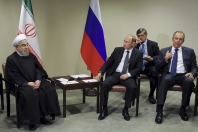Syria, Russia and the Arabs: Could it get any worse?
Jamal Khashoggi/Al Arabiya/October 06/15
Last Wednesday, the Russians bombed Homs at noon, and the Americans bombed Aleppo in the afternoon. Both say the Islamic State of Iraq and Syria (ISIS) is the target, while the Syrian opposition – which published a list of the names of around 40 dead civilians – claims it is the one being bombed. Meanwhile, Syrian President Bashar al-Assad must have been following news of these bombings with a map of his homeland in front of him and a smile on his face. Thousands of defeated Arabs are toasting each other over Russian aggression against an Arab land. Things cannot get any worse, but we need to prepare for another tragedy at the hands of Assad. The Russians are cruel players at war, and do not value human rights. They burn the land and its residents just to eliminate one fighter. They did that in Afghanistan, displacing 5 million Afghans in one year. They did the same in Chechnya. If the Russians are not stopped, they will repeat the same crimes in Syria, leaving us with more displaced, dead and wounded civilians, while the only relief we can offer is more camps, caravans and another donor conference.
Saudi challenge
What is happening is a big challenge for Saudi Arabia, which will not bare an Iranian victory in Syria that would take away the beating heart of Arabism. This is not a Russian occupation, but a Russian-Iranian deal. Assad could not win this war despite the ferocity of Iran and Hezbollah. His aircraft is capable only of killing civilians with barrel-bombs. This is why he resorted to Russia. It is a partnership. It would be ignorant to believe that the Russian military presence in Syria will be at the expense of Iran. President Vladimir Putin clearly stated that Russian participation will be aerial only. They are all standing in one operation room. The first fires smart bombs and provides satellite photos, while the others move on the ground to destroy the Syrian revolution. They will continue to do so if we do not make a move. If they achieve victory, Assad will keep his presidential palace, while Iran will keep all of Syria and spreads Shiism in it, displacing whomever it wants into and out of Syria. Maybe one day we will discuss the “right of return” of Syrian refugees. Some will think I am exaggerating, but does Iranian insolence have any limits? Saudi Arabia will resist all that. I expect it will move diplomatically first to form an Arab stand rejecting Russian interference, then to establish an international stance. Then it will increase its support for the resistance.
These are dangerous grounds. The formation of an Arab stance will put to the test the sincerity of some of its allies. Egypt, for example, is enthusiastic about the Russian aggression, but no resolution can emanate from the Arab League without Egypt, and Saudi Arabia will not accept that its ally provides unprecedented support to its Russian opponent. Riyadh must point out to the Americans that this is due to their weakness. They must act to stop their dignity falling apart from Ukraine to Damascus. While Assad’s partisans in Beirut, Cairo and Tehran were celebrating an expected Russian victory in Syria, Saudi Foreign Minister Adel al-Jubeir was more decisive, saying “military action” was one of two options to overthrow Assad. Riyadh believes that no peace will be achieved in his presence.
Those who are not acquainted with Saudi Arabia must know that it does not resort to threats and intimidation if it cannot act on them. For example, it never threatened to destroy Israel. This is why Jubeir’s insistence on the expression “military action” means Riyadh is ready for confrontation.
Options
There are 1,000 ways to thwart the Iranian-Russian project in Syria, and Saudi Arabia will have to make a choice depending on its knowledge of the Syrian arena and its popular support there. The first step will be to protect the two most important factions targeted by the Russians: Ahrar al-Sham and the Army of Islam, whose images are being distorted to make them seem like ISIS, even though they are fighting it more than the regime. Thousands of defeated Arabs are toasting each other over Russian aggression against an Arab land. Ahrar al-Sham is being subjected to a smear campaign in Germany, where it was sent to court to be considered a terrorist organization. If such a decision is issued, it will be easier to criminalize its members throughout Europe. This will mean criminalizing the most powerful moderate Syrian faction. Saudi Arabia is carrying a heavy weight on its shoulders, but this has to be done. Iran now feels more confident in becoming a bully. The Russians are taking charge of the aerial war, while Tehran sends thousands to complete the mission on the ground. Its confidence has pushed it to venture into Yemen too. Iranian shipments of weapons, confiscated by coalition forces, are an example of that. So too are threats by Supreme leader Ali Khamenei to use force against Riyadh following the hajj pilgrim stampede. Russia too has tools of pressure, as it is a superpower that can influence the U.N. Security Council to behave negatively regarding the war in Yemen. It would be naïve to believe that Riyadh can choose between Yemen and Syria. This is not a struggle for land, or a conflict between a secular Syria and an Islamic one. It is a struggle between tyranny and freedom, and freedom will prevail. This is the real Arab liberation war, so we must win.
Panorama: Russian violation of Turkish airspace and situation in Syria
Dr. Theodore Karasik/Al Arabiya/October 06/15






















